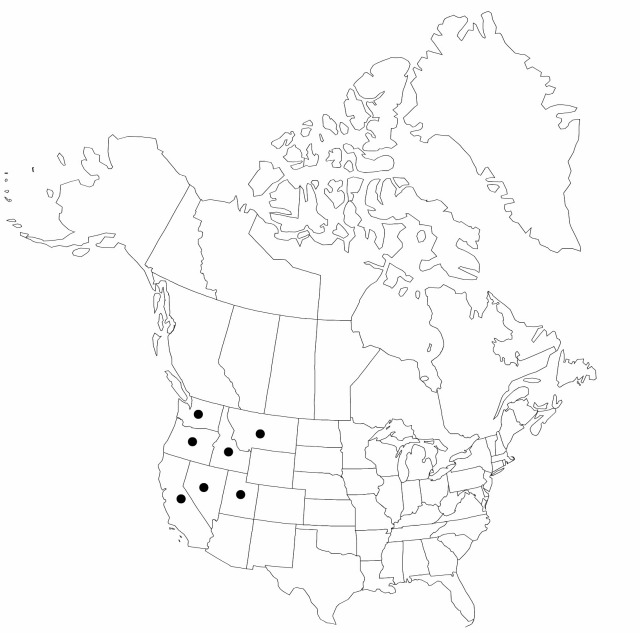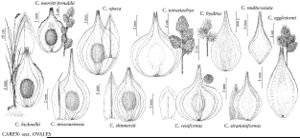Carex straminiformis
Mem. Torrey Bot. Club 1: 24. 1889.
Plants densely cespitose. Culms 20–50 cm. Leaves: sheaths adaxially white-hyaline, often cross-corrugated, summits U-shaped or rounded, sometimes prolonged to 2.5 mm beyond collar; distal ligules 1–2.5(–3.5) mm; blades 2–4(–7) per fertile culm, 8–25 cm × (2.5–)3–4 mm. Inflorescences dense, gold or brown, 1.3–3 cm × 12–20 mm; proximal internode 0.5–3.9(–5) mm; 2d internode 1–3(–4) mm; proximal bracts scalelike or bristlelike, shorter than inflorescences. Spikes 3–8, usually distinct, broadly ovoid, 9–12 × 6–9 mm, base rounded to attenuate, apex rounded. Pistillate scales white, gold, red-brown, or coppery, with pale to green midstripe, lanceolate to ovate, 3.2–4.8 mm, shorter and narrower than perigynia, margin white, 0–0.15(–0.3) mm wide, apex acute to acuminate. Perigynia ascending to spreading, green, straw colored, or occasionally white, 10–20-veined abaxially, conspicuously 0–12-veined adaxially, thin, broadly ovate, flat except over achene, 4–5.8 × 1.8–3.4 mm, 0.3–0.5(–0.6) mm thick, 1.7–2.3 times as long as wide, margin flat, including wing 0.4–1 mm wide, edge minutely crinkled and ciliate-serrulate at least distally; beak spreading, gold, red-brown to dark brown, sometimes white-hyaline at tip, flat, ± ciliate-serrulate, sometimes cylindric, unwinged, ± entire for 0.5–0.7 mm, abaxial suture usually inconspicuous, distance from beak tip to achene 2.2–3 mm. Achenes elliptic to broadly obovate, (1.4–)1.7–2.4 × 1–1.6 mm, 0.3–0.5 mm thick.
Phenology: Fruiting summer.
Habitat: Rocky, gravelly soils
Elevation: 1900–3800 m
Distribution

Calif., Idaho, Mont., Nev., Oreg., Utah, Wash.
Discussion
Selected References
None.
